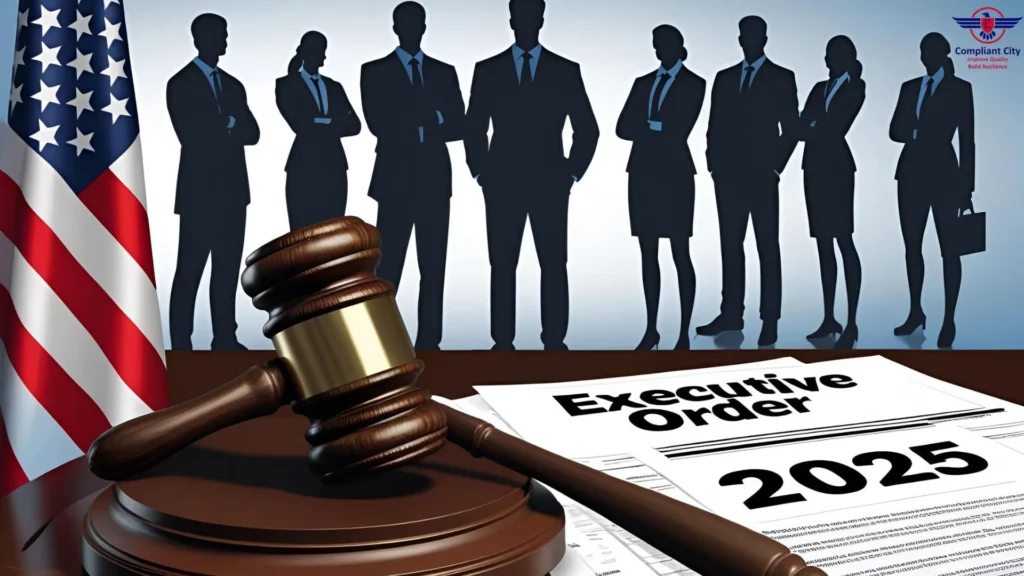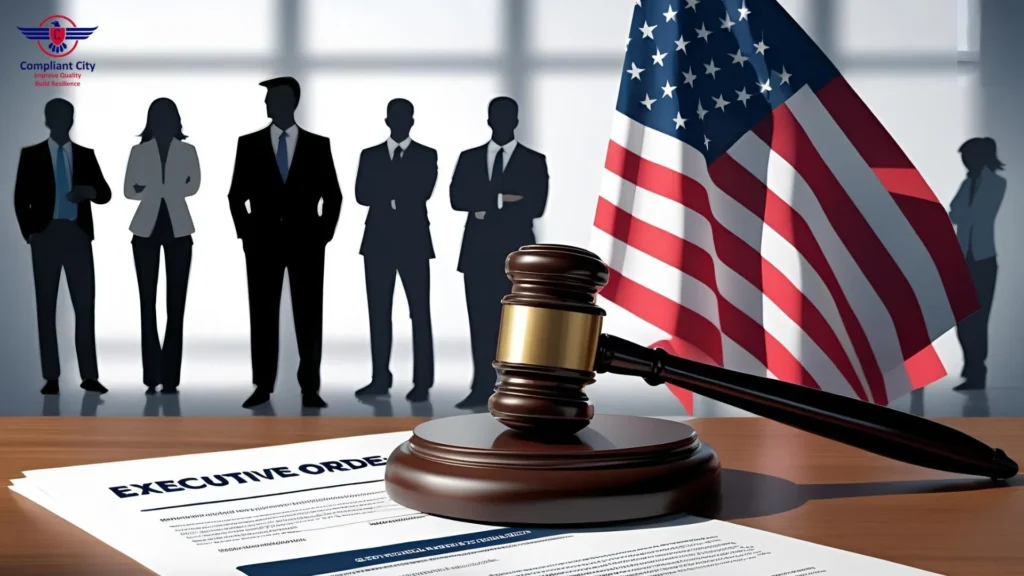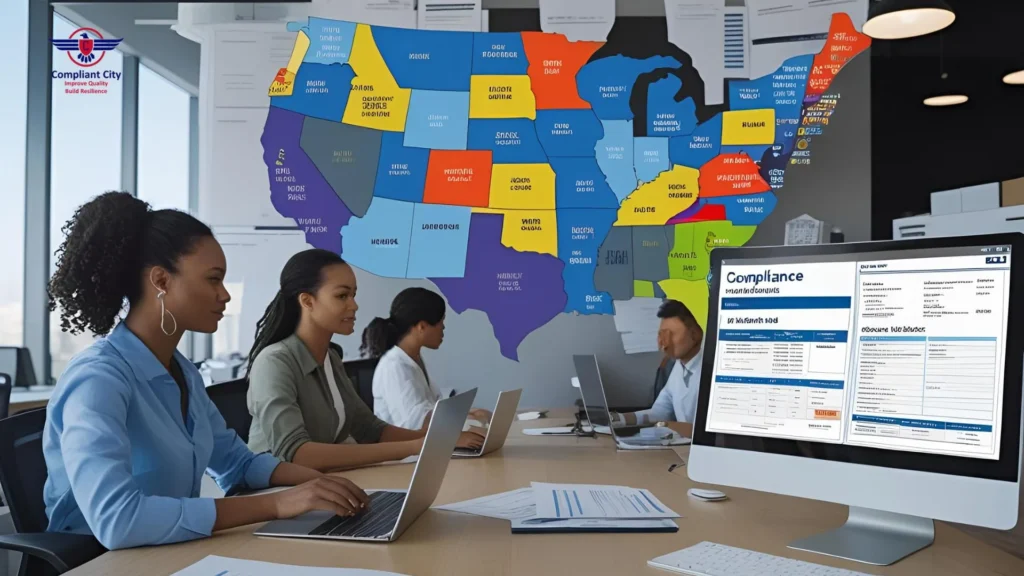“In an era of rapid regulatory evolution, adaptability isn’t just a strategy—it’s survival.” – Peter Drucker
The legal landscape in the United States is being altered by the new Trump administration. While attention has focused on national security, executive orders targeting matters of supply chain security have not made the headlines.
This trend affects businesses in many ways.
The changes by Trump to compliance adjust how companies deal with regulations. No reliable information says that President Trump named Mexican drug cartels terrorist organizations during his second term. This pace is new and tough for business.
Trump’s policies impact more than just common procedures for rules. Companies face a world of universal and diverse laws. This bespeaks that enterprises must be fast and clever in their strategy of compliance.
Key Outcomes
- Executive orders are ramping up regulatory changes
- Businesses need to get nimble with compliance
- Supply chain security comes into sharp focus
- State legislation can either complement or clash with federal initiatives
- Risk assessment is essential as organizations enter new regulatory settings
Understanding the Impact of Trump Administration Executive Orders on Employment Laws
The Trump administration has changed a lot of U.S. employment laws. They have established new rules for federal contractors and diversity management programs. This makes it very difficult for business in every corner of this land.
The Trump administration has brought sweeping changes to labor laws. These changes are felt particularly acutely by federal contractors and private employers.
Major Development: Changes in Federal Contractor Requirements
The rules for federal contracts have been substantially overhauled. These include:
- Elimination of traditional affirmative action requirements
- Considerably more stringent standards for Diversity, Equity, and Inclusion (DEI) programs
- Potential False Claims Act (FCA) liability for non-compliance
- Modifications to required affirmative actions and DEI programs
All this has had a profound impact on diversity programs—no power shall ever take this away!
On January 21, 2025, President Trump signed Executive Order 14173, “Ending Illegal Discrimination and Restoring Merit-Based Opportunity.” This removes the ability of private organizations to conduct DEI (Diversity, Equity, and Inclusion) or EIA (Equal Opportunity Employment) programs for jobs created by Federal contracts.
This Order abrogates certain parts of the 1965 Order on Equal Employment Opportunity for Federal Contracting jobs.
“Ending Illegal Discrimination and Restoring Merit-Based Opportunity” represents a major turning point in the framework of US employment law.
Mode of Implementing and Compliance Deadlines
Upon expiration of the Grace Period:
- Compliance Milestone: April 21, 2025
- OFCCP Closure Cases by: January 31, 2025
- Timeline: 4 Months from Order to Report Implementation
The company must find and discard its old ways of hiring and diversity. This is vital if businesses are to avoid financial and legal problems.
New Trump Administration in USA Influences Compliance Industry
The Trump administration is affecting many aspects of the compliance industry. The changes it brings have aroused repercussions for a number of sectors. There is always some new trouble ready and waiting when 67 percent of executives think that American laws might undermine the development of their enterprises.
Important Changes Underway in Several Industries:
- Finance: Many new shifts in the rules
- Healthcare: Exploring new ways to obey rules
- High Technology: Facing a more hostile environment in policies
Trump’s policies have placed companies in a lamentable predicament. The key is to adapt rapidly now before it’s too late.
What the Pressures Are:
- Bankers think their decisions will be affected by 82% of by-elections
- Leaders in healthcare feel that rules will undergo tremendous changes
- 80% of technology and media heads face something they say is unprecedented
“Today, the work of compliance is not only about keeping things the way they are. It’s a matter also of reaching out and getting ready for business as soon as the regulations come of themselves.” – An Unnamed Industry Authority
To Respond to the Rules Changes…
Companies must have strong, flexible plans since less regulation by the Trump administration means both challenges and opportunities for growth in different sectors.

Immigration Enforcement and Compliance with Workplace Measures
The Trump administration has changed US immigration policy, resulting in much greater risk for employers. Stricter workplace regulations and more immigration checks will come as the new 2025 Rules. Employers will also take on greater responsibility in an immigration enforcement action.
More immigration companies would seem to be bracing now for another wave of large-scale raids in your old operations, this time under the Trump administration. Either that or in 2019 some other comparable incident happened. As of now, there have been no recent reports about similar-sized raids anywhere in the industry.
I-9 Audit Preparation and Requirements
Employers need strong I-9 audit plans. Steps to follow:
- Maiden Form I-9 for all current employees
- Correct form errors then and there
- Maintain records on former employees for the right period
Carrying Out Immigration Raids and Worksite Enforcement Actions
Some industries are likely to face greater inspection under the new immigration rules:
- Restaurant businesses
- Hotels
- Construction
- Cleaning services
- Agriculture
“Preparation is the best antidote against sudden immigration enforcement actions.”
Employer Response Strategies
When there are ICE raids, make detailed planning by having:
- An HR person or one from your legal department in charge of the matter
- A clear plan for dealing with immigration questions
- Current and old employee files kept separately and in a safe place
More Strict Rules for Employers in 2025
Employers must be proactive under the 2025 regulations. They need to get prepared for changes in immigration rules and then act quickly when needed.
Artificial Intelligence and Technology Compliance Framework
Steps are being taken on data privacy laws, as well as cybersecurity. The idea behind these steps is both to keep up with the pace of technological progress and at the same time protect our country.
The administration’s plan includes:
- Disseminate market-driven methods to speed the development of AI technology
- Give fewer federal regulations
- Enhancing national security through new technology
“We seek to innovate within the confines of those important traditional limits under this policy.” – Trump Administration AI Policy Statement
Financial Compliance and AI Governance
The National Institute of Standards and Technology (NIST) is going to develop voluntary guidelines for trustworthy AI. This will give businesses flexible rules to follow. Companies need to think about the following:
- Building a strong AI governance outside the corporation
- Coping with various state mandates
- Complying with international standards such as the EU AI Act
The administration’s policy is a major turn in support of tech. It also ensures US interests in AI remain safe.
Trade Law and Sanctions Measures Under the New Administration
Trump’s administration changed the way the US interacts with world trade. A landmark document, America First Trade Policy, was published on January 20, 2025. That required the industry’s business model to meet new norms and requirements.
Supply Chain Security Requirements for New Trade Policies
In the following areas worked aiming to keep the supply chain safe:
- Monitoring global trade partners to increase checks
- Tightening regulations against money laundering
- Looking in more detail for risks and vulnerabilities in global supply chains
- Strengthened due diligence processes
The new era brought a major overhaul in financial regulations. Recent reports have it that President Trump will announce plans to slap 25% tariffs on imports from Canada and Mexico, and 10% tariffs on Chinese goods. The goal is to cut off things such as illegal immigration and drug flow into the United States.
“Trade compliance is no longer a box on form — it is an extra critical strategic imperative.” – Trump Administration Trade Policy Advisory
Trade Agency Designations
The administration took a tough line on trade and carried out all these measures:
- Use of powers under the International Emergency Economic Powers Act (IEEPA)
- Examination of the entire trade relationship
- Assessment of economic security threats
These changes are quite considerable and come thick and fast. This pace helps businesses to stay ahead in the global market.
Corporate Governance and Antitrust
The Trump administration is changing the way corporate governance and financial regulation work. This includes big changes in how antitrust enforcement is done. All businesses will be affected by these changes in one way or another.
Areas of Impact:
- Streamlined merger review systems
- Loosening the boundaries between consumer welfare-oriented regulations
- Enforcement regimes that are too strict
- Use of hard-line statutory measures to control anti-competitive behaviour
- Consumer welfare standards
- Innovation and entrepreneurship
So far, there is no sign of a shift in market competition policy at the FTC through any official statement. It will instead concentrate on the practical and economic effects which result from actions.
“Our aim: robust competition, which enables American businesses to prosper.” – Perspective for My New Colleagues on the FTC’s Leadership
Conclusion
Trump’s policies are changing the way businesses have to comply with rules in various areas. These include regulations on reporting financial information, keeping track of profits and losses, making environmental reviews for projects, and managing company standards.
His changes have extended to laws that now stipulate how soon workers must attend their jobs after starting employment; that employers can be penalized if they refuse to give out information about safety training procedures or will be responsible for any injury occurring at work when an employee has not been trained in those tasks.
Rules like U.S. accounting regulations or ISO9000 2008 environmental standards are now part of our business world.
In 2025, companies can expect a fresh set of compliance challenges. They mustn’t think in black-and-white terms, particularly as regards healthcare and finance. State laws like California’s mean companies have to operate under an increasingly complex legal framework.
“Companies must stay ahead of the game. ‘Rules change,’” Peter Leach said 13 years ago. “Even the MBA exam is no proof of what’s coming. Companies need to keep learning and they must remain on their toes. ‘Change or die,’ as management guru Peter Drucker famously said.”
In the United States, the future of compliance will keep changing. Companies that can move quickly to understand and observe new rules will fare well. Being prepared, watching for changes, and moving forward is the only way to success.




